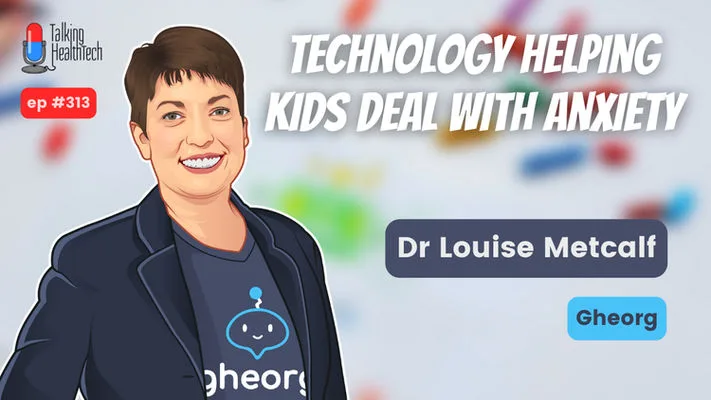Talking HealthTech: 313 – Technology helping kids deal with anxiety. Dr Louise Metcalf, Gheorg

Source: talkinghealthtech.com

Provided by:
Talking HealthTech
Published on:
2 December 2022
Dr Louise Metcalf is founder and CEO of Gheorg, and in this episode Pete and Louise talk about cyber security and digital health, regulation and digital therapeutics, rising mental health issues in kids and so much more
Catching up with Gheorg
The company is busy with its efforts on the market in the United States right now. Because in the United States, there are already three times as many users as there are in Australia, something that only took a few weeks to develop. Aside from that, innovations are now being worked on to translate Gheorg and its platform into Italian, Chinese Mandarin, and Naga, a common language in Western Australia. In the same grant, the integration of Gheorg into the psych system is proposed.
Gheorg the cute little robot
Gheorg is a program developed in collaboration with more than a thousand children from Australia. It teaches children how to handle complicated feelings and emotions. Through cognitive behavioural therapy (CBT), stories within the platform assist children in managing their behaviour and mental health, all of which are accomplished through adorable little robot characters that the children themselves can personalise.
Accessibility to Children
It is bringing together young people who need the platform’s services. The company worked with Salvos to assist people in Australia seeking the technology and translating the platform for populations in Western Australia that speak Chinese as well as Naga, which is related to the area.
It is also an excellent solution for international distribution, such as to children in Myanmar who are torn by war, in Ukraine, or other places worldwide. Children can relieve mental health symptoms by talking to Gheorg when they do not have access to proper care. Gheorg will act as a mental health first responder in those regions.
Regulation on Digital Therapeutics
Gaining approval from the TGA or FDA is a complicated procedure that presents a significant barrier to entry for startups in the Digital Therapeutics market. It is a substantial obstacle to bringing these treatments to the public and helping people get healthier.
Dr. Louise says that although she understands that complying with regulations might be a burden for businesses, she is on the side of the government bodies that enforce them. Regulations play an essential role in the market because they help screen out bad actors that put commercial gains before patient care. This is especially true in the healthcare sector, where digital therapies, AI, and other forms of innovation play a crucial role in providing new and better treatments for patients.
Collaboration in Mental HealthTech
When there is a lack of data, the necessity of collaboration becomes even more vital in the process of developing the technology. Because it is essential to incorporate data at this point in developing the platform’s many functions, collaboration with various AI and machine learning specialists in Australia is required.
Currently, Gheorg contains an advanced build of its therapies; however, they will be made available to the public once technology can gather sufficient data to support the outcomes required to succeed. It is essential to do research before putting its effectiveness to the test.
Gheorg as a safety net
Gheorg creates a feedback loop within the family that connects children back into their social networks. This feedback loop functions as a safety net for children who use the platform. Gheorg is a platform that monitors children to see what they are saying, mainly when there is bullying involved. Gheorg is also used to provide the child with tools to help them, and psychologists closely monitor the platform’s performance.
Custodian of cyber information
Dr. Louise and the rest of her team are entirely consumed with privacy, confidentiality, and cybersecurity concerns. They are ensuring that the system does not pick up on the user’s identity in any way. In addition, they are working on a technology that analyses the tone of a person’s voice and can be used as a diagnostic tool for mental health. This is being done while maintaining the necessary level of confidentiality.
Connecting through THT+
According to Louise, the opportunity to network with other experts is one of the most rewarding experiences one can have in their career, and working in the field of health technology affords this opportunity. It is especially beneficial for persons with a far higher level of experience than she does to meet specialists skilled in several aspects of digital healthcare since these specialists may provide insight into a variety of digital healthcare-related topics.
Going to the next level
At the moment, Louise is on the hunt for an investor who profoundly understands how artificial intelligence systems are developed. It can be challenging to track down investors in Australia who are focused on mental health.
What’s next for Gheorg
Aside from the incorporation of the platform within the healthcare system of Western Australia, the company is working on schools’ hesitancy to bring technology to their campuses. Collaborators with previous experience working in the education sector are being sought for this project.
Additionally, the company is collaborating with the organisations of India and Nepal to develop products appropriate for those nations, particularly regarding the translation of Gheorg.